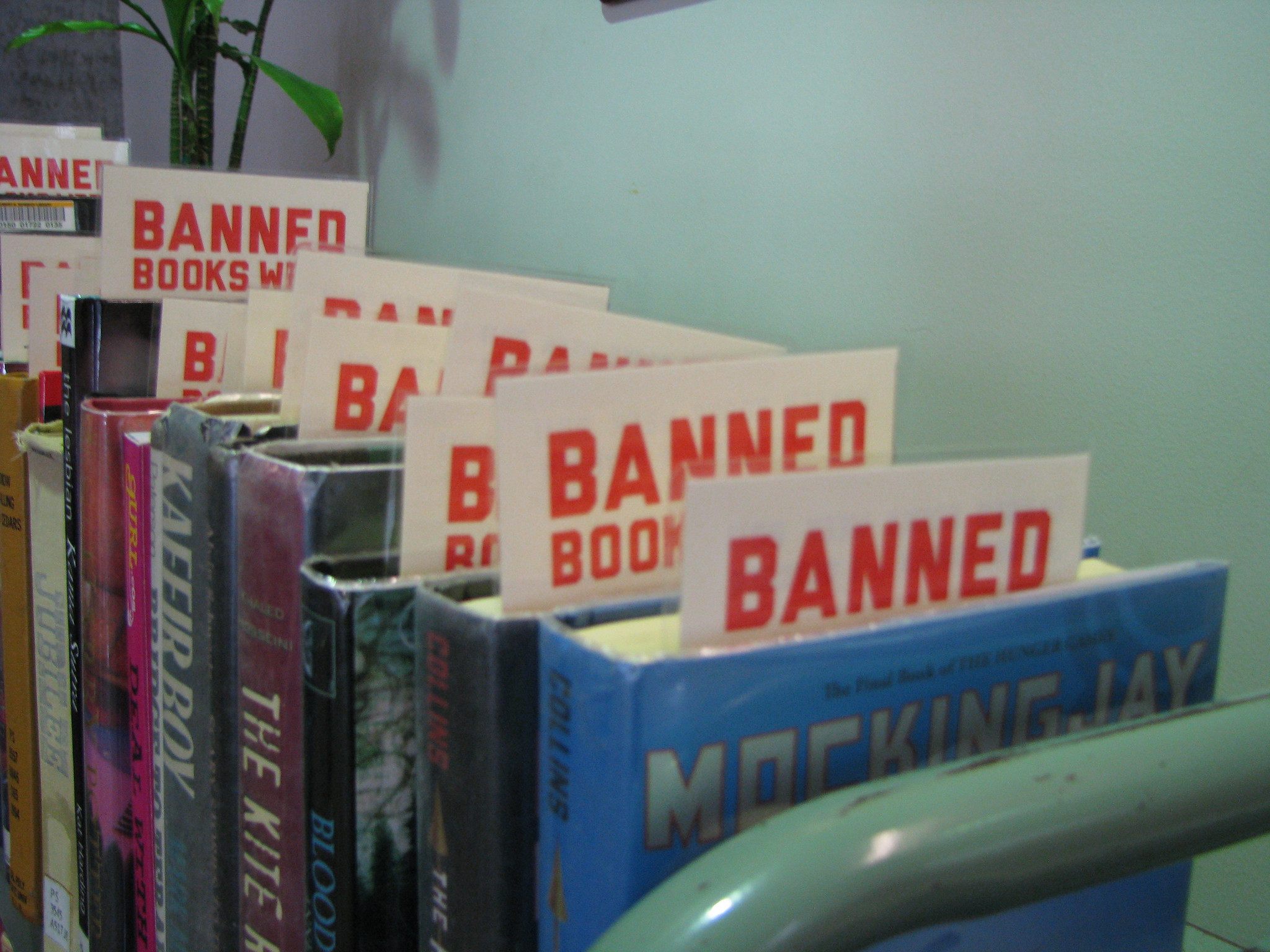Just over a month after Banned Books Week 2022, the risk to literature has intensified. Depending on the outcome of the US midterms, moves from Republican lawmakers to silence certain books could take a firmer grip.
On library shelves in the USA, certain books have fallen prey to challenges and subsequent localised bannings. There’s a blank space where Toni Morrison’s The Bluest Eye used to sit in many Florida schools (and beyond), while Juno Dawson’s This Book is Gay has been banned in a septuplet of states. The incredible Homegoing by Yaa Gyasi, an interweaving of narratives that crosses generations and continents, has been carted away on the librarian’s trolley in areas of Florida, Georgia, Missouri and Texas.
Of the banned works, the vast majority centre stories of people of colour or LGBTQ+ characters and authors. A recent report from PEN America found there were over 2,500 book bans across 32 states between July 2021 and June 2022. And where America goes, the rest of the world often follows.
In the autumn issue of Index on Censorship, we explored book bannings in the USA and the growing movement to keep literature free.
George M Johnson, author of one of the most banned books in the USA, wrote about how being banned gave them a hunger to write more, to deal with the racism and sexual identity that they had no resources to tackle as a child. We spoke to Kings Books in Tacoma, Washington State, where a monthly banned books club sets free the literature which has been erased from the shelves of school libraries and classrooms.
“You end up talking about topics that don’t normally come up in conversation because banned books cover those controversial topics [including] the clichéd things you don’t talk about in public,” the club’s co-ordinator David Raff said.
This group puts freedom to read into practice, and it is not alone. There’s the protest against book censorship in classrooms, where students in Texas staged a read-in at the Capitol Rotunda, devouring books on a Republican lawmaker’s list of condemned titles. Students in Pennsylvania stood up against books being removed from their library. Parents in Texas and Florida organised protests. Against the rising tide of book bannings, even calls to burn books which echo the darkest moments in history, people are resisting.
The big question around these book bannings is: why? Why would parents or lawmakers seek to ban The Handmaid’s Tale, The Hate U Give, or I Know Why the Caged Bird Sings? Even the stunning children’s picture book by Jessica Love, Julian is a Mermaid, does not escape the censor’s wrath in areas of Florida and Pennsylvania.
Of the banned works, the vast majority centre stories of people of colour or LGBTQ+ characters and authors. As the latest American Library Association (ALA) report puts it, the challenges are often led by conservative groups to shut down materials which “address racism, gender and sexual identity”.
The most-banned books, compiled by PEN America, paint this picture clearly. George M. Johnson’s All Boys Aren’t Blue is banned in multiple areas of 13 states, including New York and Washington. Lawn Boy by Jonathan Evison racks up bans in 12 states. And Maia Kobabe’s graphic novel Gender Queer: A Memoir, is missing from shelves in multiple school districts in 15 states, landing the unenviable spot as most-banned book.
In Florida, Governor Ron DeSantis signed a bill that allowed parents to search a list of books available in schools and to object, specifically referencing Lawn Boy as containing passages of “paedophilia”. Meanwhile Moms for Liberty was one of the groups that spearheaded the campaign for All Boys Aren’t Blue to be banned, tweeting: “They [school board members] want to rob children of their innocence.”
I spoke to Nick Higgins, the chief librarian at Brooklyn Public Library, where the Books Unbanned project supports young people across the USA facing book challenges or outright bans in their communities. Brooklyn might not be at the sharp end of book bannings, but they’ve extended their relatively censorship-free status to allow young people across the whole country to access their catalogue of half a million eBooks and audiobooks using a free library card – whether the books are banned or not. Higgins says the library wants everyone to have access to a well-maintained, diverse, broad spectrum of ideas.
“This is what it means to live in a pluralistic society,” he said. “You are encountered with ideas that you agree with, and ideas that you don’t agree with, and the diversity of a community is something that makes us richer, stronger, more empathetic to one another, and is really necessary for a healthy democratic society.”
The recent spate of book challenges and bans, he said, is a movement to silence particular voices and lock away those narratives.
“What that says to a young person […] trying to seek out voices that sound like their own, characters that speak to them – and they find adults in their communities taking those stories off the shelves and hiding them away – it says to that young person that they don’t belong in that community, they have no place in that community and their voice doesn’t matter,” he said.
And the library hasn’t stopped with the Books Unbanned project. There’s a virtual banned books club, most recently discussing Gender Queer by Maia Kobabe with teen librarian Jes G. Young adult interns also formed the Teen Intellectual Freedom Council, creating a network of young people. They meet remotely with a group of teens in Austin, Texas – the state that tops the list in number of bans and where in 2021 a bill passed prohibiting lessons where “an individual should feel discomfort, guilt, anguish, or any other form of psychological distress on account of the individual’s race or sex”. One of the bill’s sponsors, Representative Matt Krause, followed up by demanding that libraries tell him if they carried any of the 850 books on his hit list.
“It’s a troubling development in this fight, where lawmakers are getting involved in basically doing the work of professional librarians, are doing the work of professional educators, and making the case that because they in some way, shape or form are allocating funds to support this institution, then they have the say on what is actually presented on the shelves or in the classroom,” Higgins said.
The #FReadom campaign in Texas is another grassroots effort. Sparked in response to Matt Krause’s list of condemned books, #FReadom started life as a Twitter hashtag where people were asked to tweet about diverse books across a day of action. After a huge success, the campaign morphed into a website, alongside behind-the-scenes work to support librarians facing book challenges. The goal is to uplift and support librarians, as well as providing resources for those who want to speak up. I spoke to retired librarian and one of the founders of #FReadom, Carolyn Foote.
“Obviously there’s a hunger for fighting back against censorship and fighting for intellectual freedom,” Foote told me. “So many librarians are scared to speak up. And so I’ve kind of become the spokesperson for our group because I am retired. I don’t have an institution keeping an eye on what I’m saying.”
Book challenges, she said, are extremely isolating for librarians. But the empathy and support the campaign musters is designed to give people hope, and to remind people who librarians are.
When Matt Krause’s list of books came out, she remembers how glaringly obvious it was that the target was books about race, authors of colour and LGBTQ+ topics.
“We felt like it was so important to speak up on [behalf of our] more marginalised kids or more vulnerable kids, because it was their stories being removed from the shelf,” she said.
When America’s bookshelves are emptied of very specific books, everyone loses. The young readers, the librarians, the teachers and the communities that miss out on important and varied conversations. Uncomfortable topics are buried instead of addressed, brilliant books become taboo. As Carolyn Foote said to me, “Libraries are about truth telling.”
But while the book ban figures increase and a new threat looms, the movement to unban books shows no signs of slowing down.
An earlier modified version of this article was originally published on The Bookseller.






